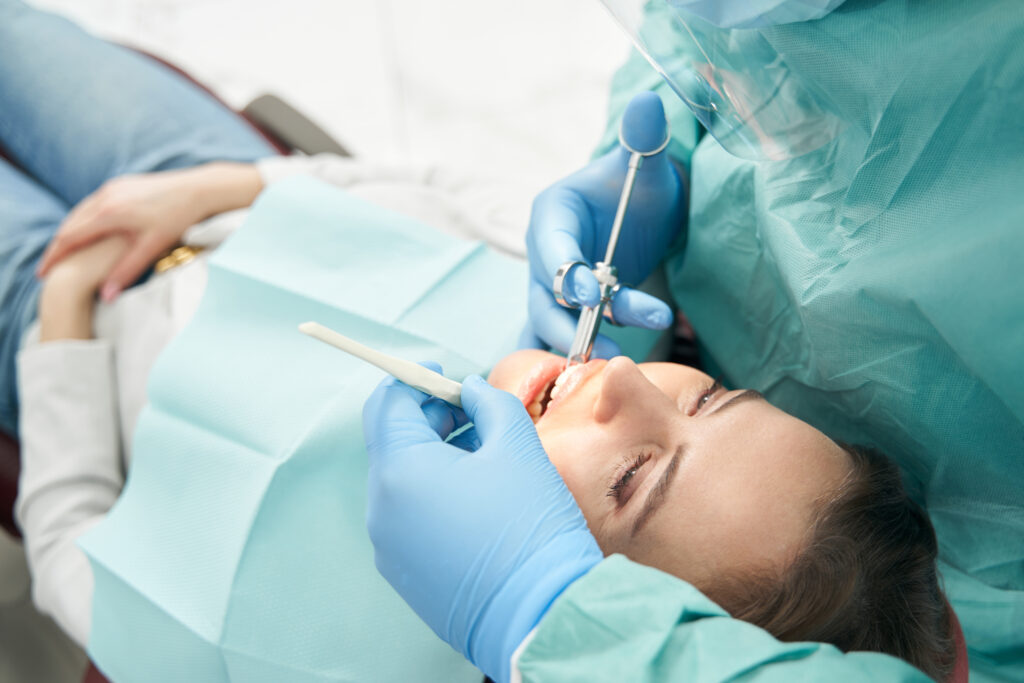If you’ve ever avoided getting necessary dental care because you’re afraid of going to the dentist, you’re not alone.
People can go years without routine cleanings or getting treatment for dental issues due to anxiety related to past negative experiences, fear of pain, or discomfort with dental instruments and procedures.
Not only can dental sedation can help you overcome your anxiety and get the care you need, there are several other reasons why you might want to consider it, as well:
- If you have increased sensitivity to pain or a strong gag reflex, getting the dental care you need can be difficult. Sedation minimizes these issues, allowing your dentist to work efficiently while keeping you comfortable.
- It can be challenging to sit through lengthy or complex procedures like root canals, extractions, or multiple fillings. Sedation makes it easier for you to handle long appointments without feeling uncomfortable or restless.
- If you have a busy schedule or want to minimize the number of appointments needed for your treatment, sedation can enable your dentist to complete multiple procedures in one visit.
- For patients with specific medical conditions — such as severe anxiety disorders, autism, or disabilities — sedation can help them stay calm, still, and safe during dental treatments.

TYPES OF SEDATION
During your initial office visit, your dentist will determine the right sedation for you by assessing factors like your anxiety level, pain tolerance, medical history, and the complexity of the dental work you require. This personalized approach helps match the sedation level to your specific needs, concerns, and comfort level.
Dr. Armstrong at the Mint Dental in Chattanooga offers three different types of sedation:
Nitrous Oxide
Nitrous oxide, commonly called laughing gas, is a safe sedative inhaled through a mask in a mix of 70 percent oxygen and 30 percent nitrous oxide. This type of sedation — which is also considered safe for pediatric patients — keeps you fully awake while creating a relaxed, euphoric feeling that reduces pain and your gag reflex. Once the gas is stopped, its effects fade in just three to five minutes, leaving no lingering sedation so you can safely drive home from your appointment.
Oral Sedation
With this method, you’ll be prescribed a sedative pill that you take at home before arriving at the office for treatment. The pill induces a near-sleep state, so It’s essential to arrange transportation to and from your appointment, as you’ll likely need assistance to get into a vehicle, enter our office, and move around once the sedation takes effect. While you’ll feel deeply relaxed and drowsy, you’ll still be able to follow the dentist’s instructions. As the sedative wears off, you may have little or no memory of the procedure. You should also plan for a few hours of rest at home afterward as you may still feel mildly sedated.
IV Sedation
This powerful, fast-acting sedation delivered through an IV in your arm enables your dentist to complete multiple complex treatments, such as dental implant placement or full mouth reconstruction, with minimal discomfort. During your procedure, your dentist will carefully monitor your vital signs and make the IV insertion as comfortable as possible. While you won’t be fully asleep, you likely won’t be aware of or remember the procedure afterward. Like with oral sedation, it’s essential to arrange transportation beforehand, as you may feel groggy for several hours and may need assistance getting home and settled in to rest.
Note: We are the only general dentist practice in the Chattanooga area certified to administer IV sedation, so there is no need for an outside anesthesiologist.
During your office visit, be sure to ask questions and share any concerns or discomfort you may have so our team can provide a relaxed, comfortable, and enjoyable experience. To schedule your consultation, contact us by submitting our form or calling us at (423) 250-1879.



